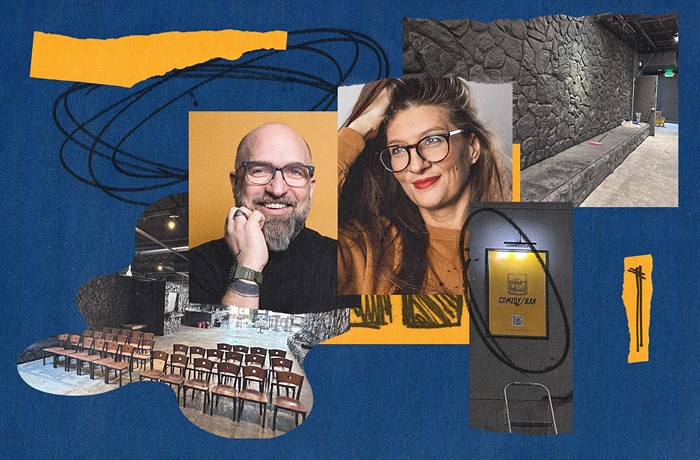
Although John Cleese's Monday night show at McCaw Hall was billed “An Evening of Exceptional Silliness,” I half expected an hour-plus of “old man yells at
True, there was a didactic, somewhat grumpy quality to some of Cleese's set. He went to pains to spotlight how unfunny “woke” jokes were, and to emphasize the idea that "good" humor must offend—or at least cheerfully mock—somebody, anybody. His examples of the former were truly duds, but he was quarter-assing it to tip the scales to prove his point. (In December 2021, Cleese huffily ended a BBC TV interview about “cancel culture” when the host broached the subject of Dave Chappelle.) But at his advanced age, Cleese is not about to go-all in on the cultural wars with people who could be his great-grandchildren. Although he views “wokeness” as an existential threat to humor, Cleese assuredly is not MAGA, and he got in some righteous barbs against The Former Guy.

Perhaps the funniest 6'5” man in entertainment history, Cleese traced his predilection for black humor (“Or should I say 'humor of color'"? groan) to his mother, and found deep seams of morbid mirth in her lifelong depression. “You're going to miss me when I'm gone,” she told her son, to which Cleese remarked decades after her death on McCaw Hall's stage, “One day she may be proved right.” Over and over throughout the night, Cleese demonstrated that his maxim “hard-edged jokes get the biggest laughs” was true, due to their release of anxiety stemming from uncomfortable subjects. You thought dogs dying horrible deaths was no laughing matter? Cambridge-educated John Marwood Cleese begs to differ.
Cleese also reeled off hoary yet nonetheless LOL-inducing jokes about various European ethnicities, but when he came to Mexicans and Jews, one could sense the sphincters tightening among the 99-percent White audience. His decision to pause and listen after merely saying the words "Mexicans" and "Jews" successfully highlighted how most people can easily handle funny potshots at Christians of European, Canadian, and Australian descent, but those directed at certain other groups can cause tension.
Case in point: An antisemitic joke that hinged on the audience knowing about the trope of Jews as money-hungry was admittedly clever in a technical sense, but it reflected how Cleese's comedy utopia—wherein everyone is fair game for humorous skewering—conveniently glazes over the history of oppression suffered by some of his targets, all while reinforcing the stereotypes used to justify that oppression. It's an unfortunate blind spot of this Caucasian, multimillionaire octogenarian. While not as toxic as, say, Dave Chappelle's transphobic rants, some of Cleese's jabs could be construed as punching down. His bit about the difference between White and Black fairy tales, for instance, was hacky and the set's low point; a corny and clumsy take on Ebonics. Conversely, the story about the Monty Python troupe in Dachau, which pivoted on Holocaust associations, might have been its peak.

One advantage Cleese has for an aging comic is his rich history in the television and film industries, and avidly plunder it he did. He devoted a portion of the set to amusing reminiscences of various scenes from Monty Python's Flying Circus TV show, Monty Python and the Holy Grail, Monty Python's The Meaning of Life, A Fish Called Wanda, and his hilarious eulogy at Python mate Graham Chapman's funeral. (Oddly, though, Cleese devoted no time to the excellent 1970s sitcom Fawlty Towers.)
The performance concluded with “cheeky and irreverent” questions from the audience. Cleese's daughter, Camilla, who opened the night with some stand-up, read those queries. Dad's responses were often inspired. The Q&A session also allowed the father-daughter team's gregariously antagonistic rapport to flourish.
One couldn't help seeing parallels with Paul McCartney's Got Back Tour, which touched down in Seattle earlier in May. This event was akin to the comedy version of a legacy musical act's greatest-hits performance. At this point, Cleese is hardly a fresh voice in comedy, but his wit's still fairly sharp, even if the physical humor for which he's known has been retired. In 2022, he's a sit-down comedian who's somewhat coasting on the metric tonnage of goodwill he's accrued over the decades on the small and silver screens and in theaters. He's earned this victory lap, even if it's partially inspired by having to pay off a $20 million alimony to one of his many ex-wives.
A few words about Camilla Cleese's brief set. She's a 6'1” actor/comedian in her late 30s who looks like the top spiker on the women's Olympic volleyball team, so unsurprisingly she riffed on the travails of being tall and how that impacts dating. She also discussed the problems with baby showers and gender-reveal parties, and she asserted herself as a proponent of women's rights. “Equal pay is important,” she stressed. “Tell my dad that.” When she introduced her father, she announced, “You know him from Pink Panther 2.” Pops' first words to the crowd were perfectly miffed: “Don't have children.”
Overall, “An Evening of Exceptional Silliness” lived up to its billing. I laughed hard and often, but some of that response was rooted in the realization that the guy who played a huge role in developing my humor-appreciation muscles during my adolescence was cracking wise before my very eyes. Yes, Cleese's trademark mustache sadly may be gone, but his wittiness remains, charming and erudite to the max. But would it have killed him to do at least one silly walk?

















